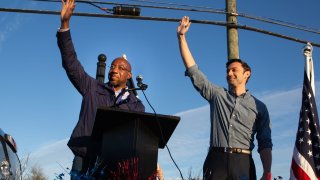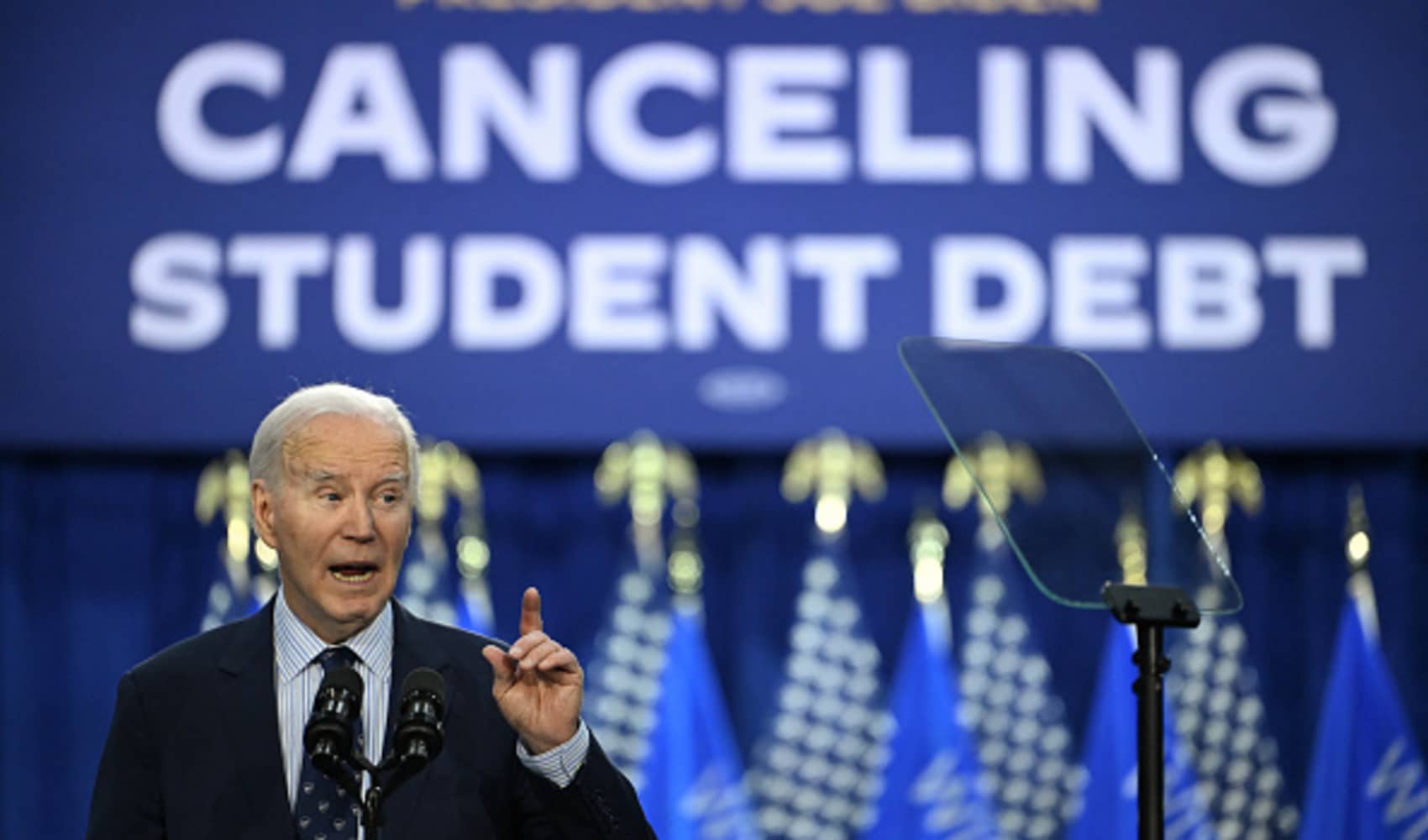
- A Democratic Congress could push through stimulus programs to boost the economy and that could help the stock market.
- Anticipating a win for Democrats in Georgia, investors immediately dumped bonds and tech stocks Wednesday and bought names that would benefit from infrastructure spending and stimulus.
- The powerful push from stimulus is expected to outweigh tax hikes that are likely to be implemented in the next year or two, strategists said.
Democratic control of Congress should help keep the bull market in stocks going with a big boost of fiscal spending, but it could also throw new hurdles into its path, like higher taxes and higher interest rates.
Anticipating a win for Democrats in Georgia, investors immediately dumped bonds and tech stocks Wednesday, and scooped up names in industrials and other areas that could win from big government spending.
"The market believes it could live with a Biden administration and Democratic control of the Congress," said Ed Keon, chief market strategist at QMA. "The negative of higher taxes, the market is concluding would be offset by infrastructure spending and a more aggressive action on the pandemic and a change of tone that might not be 100% positive for stocks, but the market concluded it was positive."
The Dow surged to an all-time high, ending up 1.4% at 30,829, and the small-cap Russell 2000 jumped nearly 4%.The S&P 500 rose 0.6%, while Nasdaq fell 0.6%, as technology shares fell in a rotation from growth to value and cyclicals. Big Tech also weakened on concerns that Democrats would impose higher taxes and more government regulation.
The market lost some ground when a mob supporting President Donald Trump took over Congress, causing the evacuation of the U.S. Capitol. Congress was in the process of counting the Electoral College votes for the presidential election, which Trump continues to contend he has won.
"The strength of the country is our institutions and our laws. Seeing this is disheartening but we will prevail and I think that's the message of the markets," said Keon. Strategists said the market is looking past the event and will focus instead on the transition to the administration of President-elect Joe Biden.
Money Report
"Every Democratic president since Woodrow Wilson served their first year in office with the support of a Democratic House and Senate," said Sam Stovall, CFRA chief investment strategist. "The market did very well. It gained an average of 11.3% in the [first year] of those presidents' terms in office, with only
Wilson and Carter seeing red ink."
Democrat Raphael Warnock was projected to win the Georgia U.S. Senate special election runoff against incumbent Republican Sen. Kelly Loeffler, according to NBC News. In the other Senate runoff election, Democrat Jon Ossoff was projected after the stock market close to win over Republican David Perdue.
The addition of two Democratic senators would give Democrats 50 seats, and with the GOP holding the same, Vice President-elect Kamala Harris will cast the tiebreaking vote. Strategists expect the benefits of more fiscal spending by Democrats to outweigh the market concerns about new taxes and regulation.
"There's a really big debate among investors now about how much you can do with an already divided House and a narrowly divided Senate," said Dan Clifton, head of policy research at Strategas.
But in the bond market, rates rose as investors sold bonds on the view that there will be more government spending, additional debt and more Treasury supply. The 10-year Treasury yield rose to a high of 1.05%, from just about 0.96% on Tuesday. Higher rates could pose a new risk for stocks, but it's not clear at what level the market would react.
"That's the $64,000 question. It's really tough to answer until you get there. For now, people are going to focus on round numbers, and the next round number is 1.25%," said Peter Boockvar, chief investment officer at Bleakley Advisory Group. "It already had an impact on Nasdaq stocks today. High P/E stocks are not invited to the party. That's the first reaction to rising rates."
Taxes could go higher
Goldman Sachs economists said they expect the next fiscal package to total $600 billion, equal to 2.7% of GDP, with limited tax hikes and spending increases later in the year.
Clifton expects a first stimulus to come early in the Biden administration and could include $1,400 for individuals, funds for state and local government, and extensions for unemployment benefits. He expects that package to amount to $1 trillion, and then Democrats would go for a second infrastructure package, focused on things like climate change, clean energy, health care and education.
Political strategists say Democrats may seek to raise the corporate tax rate to 25% from the 21% Republicans cut it to in the Trump administration. Biden had recommended a hike to 28%, but strategists say the Democrats may agree to a lighter version of his tax proposals in order to win over more conservative members of the party."
"You're getting more fiscal policy than you thought a few days ago. That's good for growth in 2021. You are going to get higher taxes on corporations and that's going to impact earnings in 2022 and 2023. There's a debate about whether that tax increase can go into effect in 2021 or 2022," Clifton said.
He said higher taxes on wealthy individuals could go into effect this year, raising the current highest rate of 37% to the prior 39.6% rate. Capital gains and dividend tax rates could also go from 20% to 25% or more, he said.
"They won the Senate by winning two Georgia Senate seats and those Democrats outperformed. ...The Democrats will read this as a mandate to get things done," Clifton said. "There will be huge policy differences. There will be big fights. You have a new president of the United States with a lot of political capital and he will get the party in line to get the key tax and spending items they want to get done."
But Democrats may tread more lightly than they'd like on taxes this year, depending on the course of the coronavirus.
"While the economy is still healing and the pandemic is still very much with us, there are questions about the effectiveness of a tax increase. It's difficult to imagine they're going to come in and immediately impose tax hikes across the board," said Quincy Krosby, chief market strategist at Prudential Financial. "The other question is, even if it's 50/50, you have Democratic senators who may not want to go along with it. ... It's going to be more difficult because 2022 is an important year. They won't want to lose seats."
Tobias Levkovich, chief U.S. equities strategist at Citigroup, does expect tax hikes to go into effect this year for corporations. The 4 percentage point increase in the corporate tax rate would knock $8 to $9 from expected S&P 500 company earnings of $169 for 2021. "We would expect any tax rate change to start this year and not be layered in over several years, though a case could be made for gradual increases given existing challenges from Covid-19," noted Levkovich. "The need for government revenues remains significant."
Clifton said the market should still go higher, but maybe not as fast. The S&P 500 was up more than 16% in the past year, but recovered more than 65% from its March low.
"I'm not bearish on the market. I think we have to have a re-evaluation of expectations and a Democratic Senate was not priced in to individual securities," said Clifton. "This may not be the best year of returns for the S&P 500 per se, but you can have higher economic growth and returns in more cyclical stocks like banks and energy."
Boost to growth
Bank of America economists said the prospect of more fiscal spending creates upside risk for the economic outlook and inflation forecasts.
"We think the Dems would inject $2-4 [trillion] in deficit spending with much of it frontloaded within the 10-yr budget window via reconciliation," they noted.
But as growth improves and the debt increases, yields could continue to rise. The question is what the Federal Reserve will do to counteract that.
Krosby said the market could eventually become concerned at some point that the Fed is locked into its bond-buying program, as the Treasury issues more and more debt. "This is the concern - the inability of the Fed to disengage," she said.
Jefferies economists, on the other hand, said the Fed could be prompted to pull back from its easy policy sooner than expected if the stimulus boosts the economy. They said they expect a trillion dollars in stimulus in the next few months to add about 2 percentage points to growth. "This will close the output gap roughly 4-6 quarters 'ahead of schedule,' pulling forward the Fed liftoff from 2024 to early 2023," wrote the economists.
They said a taper tantrum, or a sell-off in the bond market, was now a risk and they expect the 10-year yield to reach 2% by the end of 2021, up from their previous forecast of 1.3%.
-- CNBC's Michael Bloom contributed to this report.






